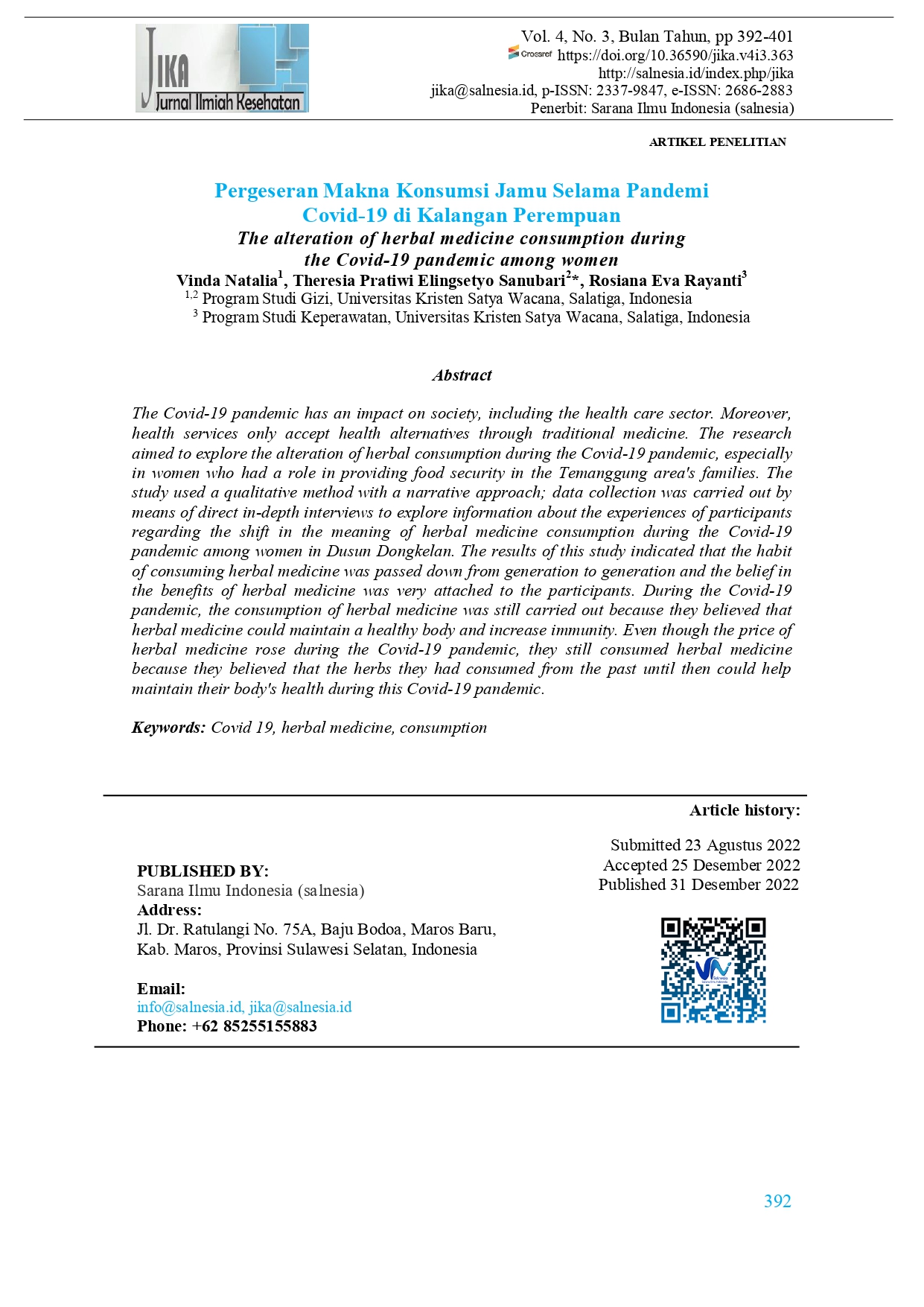The Alteration of Herbal Medicine Consumption During the Covid-19 Pandemic Among Women
DOI:
https://doi.org/10.36590/jika.v4i3.363Keywords:
Covid 19, herbal medicine, consumptionAbstract
The Covid-19 pandemic has an impact on society, including the health care sector. Moreover, health services only accept health alternatives through traditional medicine. The research aimed to explore the alteration of herbal consumption during the Covid-19 pandemic, especially in women who had a role in providing food security in the Temanggung area's families. The study used a qualitative method with a narrative approach; data collection was carried out by means of direct in-depth interviews to explore information about the experiences of participants regarding the shift in the meaning of herbal medicine consumption during the Covid-19 pandemic among women in Dusun Dongkelan. The results of this study indicated that the habit of consuming herbal medicine was passed down from generation to generation and the belief in the benefits of herbal medicine was very attached to the participants. During the Covid-19 pandemic, the consumption of herbal medicine was still carried out because they believed that herbal medicine could maintain a healthy body and increase immunity. Even though the price of herbal medicine rose during the Covid-19 pandemic, they still consumed herbal medicine because they believed that the herbs they had consumed from the past until then could help maintain their body's health during this Covid-19 pandemic.
Downloads
References
Andriati A, Wahjudi RMT. 2016. Tingkat penerimaan penggunaan jamu sebagai alternatif penggunaan obat modern pada masyarakat ekonomi rendah-menengah dan atas. Masyarakat, Kebudayaan dan Politik, 29(3): 133–145. https://doi.org/10.20473/mkp.V29I32016.133-145
Asriani PS, Bonodikun B, Yuliarti E. 2015. Pemberdayaan Perempuan Pengrajin Jamu Gendong Melalui Penerapan Teknologi Diversifikasi Produk Olahan. Jurnal Bisnis Tani, 1(1): 68–76. https://doi.org/10.35308/jbt.v1i1.583
Febriani LF, Santi DE. 2021. Kecemasan Berobat ke Pelayanan Kesehatan Selama Pandemi pada Masyarakat Randutatah Paiton Probolinggo. PSISULA: Prosiding Berkala Psikologi, 3: 34–42.
Jennifer H, Saptutyningsih E. 2015. Preferensi Individu Terhadap Pengobatan Tradisional di Indonesia. Jurnal Ekonomi & Studi Pembangunan, 16(1): 26–41.
Kusumo AR, Wiyoga FY, Perdana HP, Khairunnisa I, Suhandi RI, Prastika SS. 2020. Jamu Tradisional Indonesia: Tingkatkan Imunitas Tubuh Secara Alami Selama Pandemi. Jurnal Layanan Masyarakat (Journal of Public Services), 4(2): 465–471. https://doi.org/10.20473/jlm.v4i2.2020.465-471
Mulyani H, Widyastuti SH, Ekowati VI. 2016. Tumbuhan Herbal Sebagai Jamu Pengobatan Tradisional Terhadap Penyakit Dalam Serat Primbon Jampi Jawi Jilid I. Jurnal Penelitian Humaniora, 21(2): 73-91. https://doi.org/10.21831/hum.v21i2.13109
Ningsih IY. 2016. Studi Etnofarmasi Penggunaan Tumbuhan Obat Oleh Suku Tengger di Kabupaten Lumajang dan Malang, Jawa Timur. Pharmacy: Jurnal Farmasi Indonesia (Pharmaceutical Journal of Indonesia), 13(1): 10–20.
Paryono P, Kurniarum A. 2014. Kebiasaan Konsumsi Jamu Untuk Menjaga Kesehatan Tubuh Pada Saat Hamil Dan Setelah Melahirkan Di Desa Kajoran Klaten Selatan. Interest?: Jurnal Ilmu Kesehatan, 3(1): 64–72.
Perdani MS, Hasibuan AK. 2021. Analisis Informasi Tanaman Herbal melalui Media Sosial ditengah Masyarakat pada Pandemi Covid-19: Sebuah Tinjauan Literatur. Bencoolen Journal of Pharmacy, 1(1): 11–25. https://doi.org/10.33369/bjp.v1i1.15589
Prastiwi RS. 2018. Pengobatan Tradisional (Jamu) Dalam Perawatan Kesehatan Ibu Nifas dan Menyusui di Kabupaten Tegal. Siklus?: Journal Research Midwifery Politeknik Tegal, 7(1), Article 1. https://doi.org/10.30591/siklus.v7i1.745
Purwaningsih EH. 2013. Jamu, Obat Tradisional Asli Indonesia: Pasang Surut Pemanfaatannya di Indonesia. EJournal Kedokteran Indonesia, 1(2): 85–89. https://doi.org/10.23886/ejki.1.2065.85-89
Qona’ah S. 2020. Implementasi CSR Asia Pulp & Paper Sinar Mas Melalui Program Desa Makmur Peduli Api. Journal Komunikasi, 11(2): 111–118.
Robi Y, Kartikawati SM, Muflihati. 2019. Etnobotani Rempah Tradisional di Desa Empoto Kabupaten Sanggau Kalimantan Barat. Jurnal Hutan Lestari, 7(1): 130–142. https://doi.org/10.26418/jhl.v7i1.31179
Saragih B, Saragih FM. 2020. Description of Community Food Habits in the Covid-19 Pandemic Period. [Artikel Ilmiah]. Fakultas Pertanian Universitas Mulawarman.
Satriyati E, Biroli A, Hana SN. 2019. Pilihan Rasional Perempuan Madura Dalam Pemertahanan Tradisi Minum Jamu di Kabupaten Bangkalan Dan Sumenep. Jurnal Sosiologi Pendidikan Humanis, 4(2): 133–141. https://doi.org/10.17977/um021v4i2p133-141
Septiadi D, Maulyda MA, Widodo A. 2020. The Use of Medicinal Plants During The Covid-19 Pandemic: Perspective of Literacy and Consumption Interests For Millennial Generation. Jurnal Agribisnis Terpadu, 13(2): 205–221. https://doi.org/10.33512/jat.v13i2.9867
Shamadiyah N, Nasution P. 2018. The Role of Women in Food Security (Case Study of Rice Farmers in Blang Pala Village, Banda Baro District, Aceh Utara Regency). Indian Journal of Public Health Research & Development, 9(12): 1844. https://doi.org/10.5958/0976-5506.2018.02258.1
Sumarni W, Sudarmin S, Sumarti SS. 2019. The scientification of jamu: A study of Indonesian’s traditional medicine. Journal of Physics: Conference Series, 1321(3): 032057. https://doi.org/10.1088/1742-6596/1321/3/032057
Susilo A, Rumende CM, Pitoyo CW, Santoso WD, Yulianti M, Herikurniawan H, Sinto, R, Singh G, Nainggolan L, Nelwan EJ, Chen LK, Widhani A, Wijaya E, Wicaksana B, Maksum M, Annisa F, Jasirwan COM, Yunihastuti E. 2020. Coronavirus Disease 2019: Tinjauan Literatur Terkini. Jurnal Penyakit Dalam Indonesia, 7(1): 45–67. https://doi.org/10.7454/jpdi.v7i1.415
Utami M, Widiawati Y, Hidayah HA. 2013. Keragaman dan Pemanfaatan Simplisia Nabati yang Diperdagangkan di Purwokerto. Majalah Ilmiah Biologi BIOSFERA: A Scientific Journal, 30(1): 15–24. https://doi.org/10.20884/1.mib.2013.30.1.120
Yuliani F. 2017. The Correlation of Knowledge and The Attitude of Girl In Facing Dysmennorea in SD Islam Al-Akbar Bangsal At Mojokerto. Jurnal Ners Dan Kebidanan (Journal of Ners and Midwifery), 4(2): 168–173. https://doi.org/10.26699/jnk.v4i2.ART.p168-173
Zahrok S, Suarmini NW. 2018. Peran Perempuan Dalam Keluarga. IPTEK Journal of Proceedings Series, 61–65. https://doi.org/10.12962/j23546026.y2018i5.4422
Zobolo A, Mkabela Q. 2006. Traditional knowledge transfer of activities practised by Zulu women to manage medicinal and food plant gardens. African Journal of Range & Forage Science, 23(1): 77–80. https://doi.org/10.2989/10220110609485889

Downloads
Published
How to Cite
Issue
Section
License
Copyright (c) 2022 Vinda Natalia, Theresia Pratiwi Elingsetyo Sanubari, Rosiana Eva Rayanti

This work is licensed under a Creative Commons Attribution 4.0 International License.








